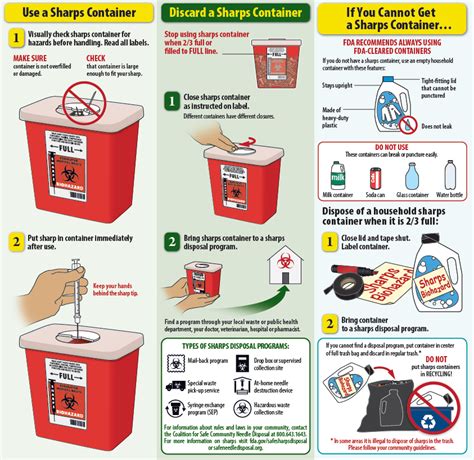How To Dispose Of Sharps Containers Nj
Ronan Farrow
Mar 31, 2025 · 3 min read

Table of Contents
How to Dispose of Sharps Containers in NJ: A Safe and Legal Guide
New Jersey residents generate a significant amount of medical waste, and a large part of that waste is comprised of sharps. Improper disposal of sharps poses a serious risk of injury and infection to both individuals and the environment. This guide will walk you through the safe and legal methods of sharps disposal in New Jersey.
Understanding Sharps and Their Risks
Sharps include any objects with sharp points or edges that can cause punctures or cuts, such as:
- Needles: Syringes, insulin pens, etc.
- Syringes: Used to administer medications.
- Lancets: Used for blood glucose monitoring.
- Scalpel blades: Used in medical procedures.
- Broken glass: Vials, ampoules, etc.
Improper disposal can lead to:
- Accidental injuries: Cuts, punctures, and infections.
- Environmental contamination: Harm to wildlife and soil.
- Violation of state regulations: Resulting in potential fines.
Approved Methods of Sharps Disposal in NJ
The safest way to dispose of sharps is through a designated sharps disposal program. These programs vary by county and municipality, so it's crucial to check your local regulations.
1. Contact Your Local Health Department
Your local health department is your first point of contact for information on sharps disposal programs in your area. They can provide details on:
- Designated collection sites: Locations where you can drop off your sharps containers.
- Home pick-up programs: Some areas offer convenient home pick-up services.
- Participating pharmacies: Certain pharmacies might accept sharps for disposal.
2. Use a Certified Sharps Container
Never use ordinary trash cans or recycling bins to dispose of sharps. Instead, use a puncture-resistant sharps container, which is specifically designed to prevent accidental punctures and leaks. These containers usually come with labels indicating proper disposal instructions.
3. Properly Fill and Seal the Container
Once your sharps container is nearly full (usually about ¾ full), securely seal the container according to the manufacturer's instructions. This typically involves sealing the lid tightly and potentially taping it shut for added security.
4. Do Not Overfill the Container
Overfilling compromises the integrity of the container and increases the risk of leaks and accidental punctures. Always use a new container once your current one is nearly full.
5. Never Reuse Sharps Containers
Once a container is sealed, it should never be reused. Dispose of it through your local program's designated channels.
What NOT to Do When Disposing of Sharps
- Do not throw sharps in the trash: This poses a significant risk to sanitation workers.
- Do not flush sharps down the toilet: This can damage plumbing systems.
- Do not recycle sharps: Sharps are not recyclable and pose a contamination risk to recycling facilities.
- Do not reuse sharps: This is incredibly dangerous and can lead to infections.
Finding Your Local Sharps Disposal Program
The key to safe and legal sharps disposal is proactive research. Begin by contacting your:
- Local health department: They are the primary source of information for your area.
- County health department: If you cannot find information locally.
- Municipal waste management authority: They might have specific instructions for sharps disposal in your region.
By following these steps, you can ensure the safe and responsible disposal of sharps, protecting yourself, your community, and the environment. Remember, proper disposal is a crucial step in preventing accidents and maintaining public health.
Featured Posts
Also read the following articles
| Article Title | Date |
|---|---|
| How To Disable Flying Is Not Enabled On This Server | Mar 31, 2025 |
| How To Get Bark On Brisket In Pellet Smoker | Mar 31, 2025 |
| How To Get A Peace Order In Maryland | Mar 31, 2025 |
| How To Control Humidity In Incubator | Mar 31, 2025 |
| How To Cook Ham Hocks In Crock Pot | Mar 31, 2025 |
Latest Posts
-
Mommed Pregnancy Test How Early
Apr 03, 2025
-
Mary Oliver How I Go To The Woods
Apr 03, 2025
-
Macon Controls Thermostat How To Use
Apr 03, 2025
-
Lucid Boost Vape How To Turn On
Apr 03, 2025
-
Lost Thc 7500mg How To Use
Apr 03, 2025
Thank you for visiting our website which covers about How To Dispose Of Sharps Containers Nj . We hope the information provided has been useful to you. Feel free to contact us if you have any questions or need further assistance. See you next time and don't miss to bookmark.
